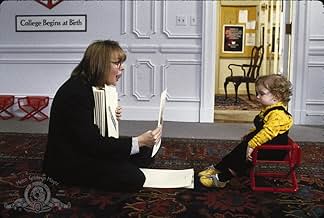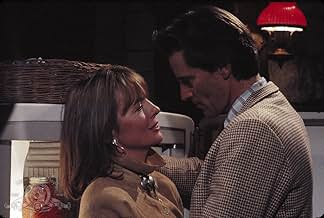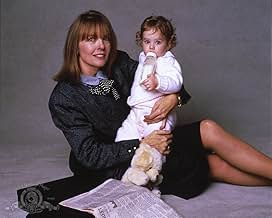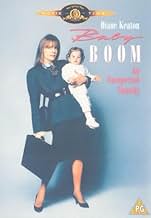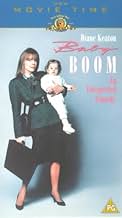VALUTAZIONE IMDb
6,3/10
20.176
LA TUA VALUTAZIONE
La vita del super yuppie J.C. viene sconvolta quando eredita un bambino da un lontano parente.La vita del super yuppie J.C. viene sconvolta quando eredita un bambino da un lontano parente.La vita del super yuppie J.C. viene sconvolta quando eredita un bambino da un lontano parente.
- Premi
- 5 candidature totali
Recensioni in evidenza
As anyone who has walked a mile or two knows, life is about choices and making decisions. And a lot of that has to do with realizing and setting priorities, because-- as a wise person once said-- You Can't Have It All. It's the lesson we all learn in our own way in our own time, according to our own personal situation, and director Charles Shyer examines one of them in his amiable comedy, `Baby Boom,' starring Diane Keaton.
J.C. Wiatt (Keaton) is a high-powered businesswoman on the fast track to success; she knows what she wants, has set her priorities, and a partnership in the firm for which she works is on the horizon. Her live-in significant other, Steven (Harold Ramis), is of a like mind-set, so they complement one another's life style perfectly. Marriage and/or having children is in neither of their respective vocabularies. then one day, J.C. `inherits' a baby, the child of a distant relative (a cousin she'd met only once) who has been killed in a tragic accident, and suddenly, J.C.'s world is turned upside down. Keeping the baby is out of the question, of course. Or is it? For J.C., it just may not be as simple as it seems, initially. She's been living life on her own terms, but now she is once again faced with choices, decisions and setting priorities. And along the way, she learns one of life's most important lessons: The fact that the lesson never ends.
There's some amusing moments and some insights to be gleaned from Shyer's film, and overall it's a pleasant, enjoyable experience. It is not, however, an entirely original idea, and Shyer laces it with stereotypes and cliches to boot. This is not necessarily a bad thing, though. If his characters are stereotypical, it's because they reflect a certain realism. J.C.'s boss, Fritz Curtis (Sam Wanamaker), for instance, typifies the image of a dedicated, hard-core businessman whom you get the feeling has to consult his day planner to work in an appointment with his own family. A stereotype? Perhaps. A reflection of reality? Definitely. The same can be said for Sam Shepard's character, Dr. Jeff Cooper, who personifies the general image of one in his situation. And again, it is a reflection of reality, stereotypical though it may be.
Even the cliches are handled in a way that makes them fresh enough to work within the context of the story, and be appreciated-- especially by those in the audience who may have experienced any of the situations presented here. When J.C. fumbles with a diaper and becomes frustrated with her own inexperience and incompetence with such things, it's cliche, but it also rings true-to-life. The important thing is, it's all well presented and actually pretty funny stuff, even if it isn't anything new.
Shyer wrote the screenplay, along with Nancy Meyers, and one angle they may have failed to cultivate fully has to do with Ken, the character played by James Spader. As J.C.'s in-house adversary, also striving to climb the corporate ladder, it may have been intrinsically more interesting had the character been a woman. The fact that Ken is a man, again, makes this particular situation fairly cliche; whereas a competitive conflict with another woman, considering J.C.'s predicament, would have expanded the avenues of possibility to a much greater extent, and certainly would have provided a more imaginative perspective.
The main reason the film works as well as it does, however, is because of the engaging performance by Diane Keaton. In J.C., she creates the antithesis of Annie Hall, but even at her most demanding there is a hint of vulnerability in J.C., a softness to that hard exterior edge she uses to shoulder her way through the business world. Keaton gives you a real sense of the conflict she's experiencing, and though it's lightheartedly rendered for the most part, you understand the underlying seriousness of it all. And the scene in which she vents her frustrations and bares her soul to Dr. Cooper is classic. Keaton's work is without question the highlight of the film, and what really brings it to life.
The supporting cast includes Pat Hingle (Hughes Larabee), Britt Leach (Verne), Kim Sebastian (Robin), Mary Gross) Charlotte, Patricia Estrin (Secretary)Victoria Jackson (Eve), Jane Elliot (Park Mom) and Linda Ellerbee (Narrator). An upbeat, entertaining film, `Baby Boom' may not be particularly memorable, but it does provide some laughs, and at the same time says something about the value of being given the opportunity to question the things we `think' we want. Kind of like saying `Never say never.' After all, who can say with any certainty where destiny may lead any of us? It's something a film like this may make you consider, inbetween the chuckles. It's the magic of the movies. I rate this one 7/10.
J.C. Wiatt (Keaton) is a high-powered businesswoman on the fast track to success; she knows what she wants, has set her priorities, and a partnership in the firm for which she works is on the horizon. Her live-in significant other, Steven (Harold Ramis), is of a like mind-set, so they complement one another's life style perfectly. Marriage and/or having children is in neither of their respective vocabularies. then one day, J.C. `inherits' a baby, the child of a distant relative (a cousin she'd met only once) who has been killed in a tragic accident, and suddenly, J.C.'s world is turned upside down. Keeping the baby is out of the question, of course. Or is it? For J.C., it just may not be as simple as it seems, initially. She's been living life on her own terms, but now she is once again faced with choices, decisions and setting priorities. And along the way, she learns one of life's most important lessons: The fact that the lesson never ends.
There's some amusing moments and some insights to be gleaned from Shyer's film, and overall it's a pleasant, enjoyable experience. It is not, however, an entirely original idea, and Shyer laces it with stereotypes and cliches to boot. This is not necessarily a bad thing, though. If his characters are stereotypical, it's because they reflect a certain realism. J.C.'s boss, Fritz Curtis (Sam Wanamaker), for instance, typifies the image of a dedicated, hard-core businessman whom you get the feeling has to consult his day planner to work in an appointment with his own family. A stereotype? Perhaps. A reflection of reality? Definitely. The same can be said for Sam Shepard's character, Dr. Jeff Cooper, who personifies the general image of one in his situation. And again, it is a reflection of reality, stereotypical though it may be.
Even the cliches are handled in a way that makes them fresh enough to work within the context of the story, and be appreciated-- especially by those in the audience who may have experienced any of the situations presented here. When J.C. fumbles with a diaper and becomes frustrated with her own inexperience and incompetence with such things, it's cliche, but it also rings true-to-life. The important thing is, it's all well presented and actually pretty funny stuff, even if it isn't anything new.
Shyer wrote the screenplay, along with Nancy Meyers, and one angle they may have failed to cultivate fully has to do with Ken, the character played by James Spader. As J.C.'s in-house adversary, also striving to climb the corporate ladder, it may have been intrinsically more interesting had the character been a woman. The fact that Ken is a man, again, makes this particular situation fairly cliche; whereas a competitive conflict with another woman, considering J.C.'s predicament, would have expanded the avenues of possibility to a much greater extent, and certainly would have provided a more imaginative perspective.
The main reason the film works as well as it does, however, is because of the engaging performance by Diane Keaton. In J.C., she creates the antithesis of Annie Hall, but even at her most demanding there is a hint of vulnerability in J.C., a softness to that hard exterior edge she uses to shoulder her way through the business world. Keaton gives you a real sense of the conflict she's experiencing, and though it's lightheartedly rendered for the most part, you understand the underlying seriousness of it all. And the scene in which she vents her frustrations and bares her soul to Dr. Cooper is classic. Keaton's work is without question the highlight of the film, and what really brings it to life.
The supporting cast includes Pat Hingle (Hughes Larabee), Britt Leach (Verne), Kim Sebastian (Robin), Mary Gross) Charlotte, Patricia Estrin (Secretary)Victoria Jackson (Eve), Jane Elliot (Park Mom) and Linda Ellerbee (Narrator). An upbeat, entertaining film, `Baby Boom' may not be particularly memorable, but it does provide some laughs, and at the same time says something about the value of being given the opportunity to question the things we `think' we want. Kind of like saying `Never say never.' After all, who can say with any certainty where destiny may lead any of us? It's something a film like this may make you consider, inbetween the chuckles. It's the magic of the movies. I rate this one 7/10.
I saw this movie years ago and enjoyed it for Diane Keaton's performance. Having revisited it in 2012, I realized that we have changed A LOT. The fast paced "Tiger Lady" that J.C. Wiatt portrays still exist, but imagine what her life would've been like if the internet was still possible. It's really hard not to root for her. J.C. is a windup toy that is wound too tight. A life on a ticking clock. So driven to succeed that she doesn't even realize when she obtains success. The fine line that Keaton skates is dated (unfortunately). A lot of this schtick wouldn't hold to today's audience, but in the context of the era, it's a great reminder of the yuppies that dominated the Reagan era.
Cue in, cute baby. She does what the story needs her to do, which is to slow down Keaton's life. Force her to see what's important. And the message is WAY too predictable but...it's still a nice journey. Again, if you follow Keaton's work, this is a very nice film that allows her to juggle through her neurosis. And it has a LOT of fun moments. It made me miss the 80's.
Cue in, cute baby. She does what the story needs her to do, which is to slow down Keaton's life. Force her to see what's important. And the message is WAY too predictable but...it's still a nice journey. Again, if you follow Keaton's work, this is a very nice film that allows her to juggle through her neurosis. And it has a LOT of fun moments. It made me miss the 80's.
J.C. (Diane Keaton) is a business executive with a fast-paced existence, including power lunches, serious hair and more. Her life is turned upside down, however, when a close relative dies and leaves J.C. in charge of a toddler girl. Suddenly, big promotions or assignments are not coming J.C.'s way and she decides to move to Vermont and be a stay at home mother. There, she meets attractive Dr. Jeff (Sam Shepard). However, her old house needs many repairs and she must make some cash. Will she opt to return to her former life?
This darling movie features Keaton at the top of her game. Her initial reactions to becoming a mother are hilarious. Shepard, also, does a fun turn as the one eligible bachelor anywhere in sight in the Vermont setting. Big corporations take a pretty severe beating as depicted in this film but it is all in fun. If you go to the library or video store and the hot new stuff is checked out, try to find this film instead. It is worthy of recognition among those who like romance movies and for those who think they don't.
This darling movie features Keaton at the top of her game. Her initial reactions to becoming a mother are hilarious. Shepard, also, does a fun turn as the one eligible bachelor anywhere in sight in the Vermont setting. Big corporations take a pretty severe beating as depicted in this film but it is all in fun. If you go to the library or video store and the hot new stuff is checked out, try to find this film instead. It is worthy of recognition among those who like romance movies and for those who think they don't.
In New York, the executive J.C. Wiatt (Diane Keaton) is a successful business woman that prioritizes her work in a publicity agency over her personal life. Her boss Fritz Curtis (Sam Wanamaker) calls her tiger lady and invites J.C. to be partner of the agency provided she brings the account of the company owned by Hughes Larrabee (Pat Hingle) to the agency. One night, J.C. is sleeping with her boyfriend Steven Buchner (Harold Ramis) and receives a phone call from England telling that she has an inheritance something from her cousin that died in an accident with his wife. J.C. believes it is money but receives their daughter, the baby girl Elizabeth, instead. Soon she feels connected to the baby, turning her life upside-down: Steven breaks with her; her assistant Ken Arrenberg (James Spader) steals Larrabee´s account in the agency; and J.C. loses her job. She decides to buy a huge real estate in Vermont to raise Elizabeth and finds many unexpected problems in the old house. But soon she sees an opportunity to develop new business while she meets the veterinarian Dr. Jeff Cooper (Sam Shepard) giving another sense to her life.
"Baby Boom" is a funny comedy about a tough executive that changes her life after inheriting a baby girl. The plot has silly and exaggerated moments, but is hilarious most of the time. Diane Keaton has good performance and the baby Elizabeth is cute. My vote is seven.
Title (Brazil):"Presente de Grego" ("A Curse in Disguise")
"Baby Boom" is a funny comedy about a tough executive that changes her life after inheriting a baby girl. The plot has silly and exaggerated moments, but is hilarious most of the time. Diane Keaton has good performance and the baby Elizabeth is cute. My vote is seven.
Title (Brazil):"Presente de Grego" ("A Curse in Disguise")
In the opening scenes of Baby Boom, set against a back drop of hustling and bustling women in the workplace, Linda Ellerbee provides us the following commentary:
"Sociologists say the new working woman is a phenomenon of our time. Take J.C. Wyatt for example, graduated first in her class at Yale, got her M.B.A. at Harvard. Has a corner office at the corner of Th and park. She works 5 to 9, makes six figures a year and they call her the "Tiger Lady". Married to her job, she lives with an investment banker married to his. They collect African Art, co-own their own co-op and have separate but equal IRA accounts. One would take it for granted that a woman like this has it all. One must never take anything for granted."
And that my friends sets up Baby Boom in a manner far better than I could even begin to. And why must one never take anything for granted? Thought you'd never ask. Just as J.C. Wyatt (Diane Keaton)is about to be made a partner in the company she works for, and a few hours before she is to have the most important business meeting of her career, J.C. is left an inheritance by some long forgotten relatives. That inheritance turns out to be cute and charming Baby Elizabeth(Kristina and Michelle Kennedy), dumped on J.C. at the airport. It seems since J.C. is the only known surviving relative, it is left to her to care for Elizabeth. Thus we end up with the first half of our fish out of water story and it's a dandy, thanks in large part once again to Miss Keaton's wonderful comedic timing, and the fact that we like and admire her character. In a formulaic comedy such as this, the value of that is inestimable.
In the early going we know that much of what we see will be how well J.C. copes with being an executive while trying to raise an infant, a job she is totally unprepared for. As for her "investment banker" Steven, whom she shares the co-op with, playing father is not his idea of a good time and he quickly makes his exit. This is J.C.'s and Elizabeth's story, so obviously he is not needed. The film could have easily gone off course in the early going, making it strictly a comedy of slapstick, but thanks to a good script by Nancy Myers and Charles Shyer, it quickly steers away from that. What we do see is J.C. not only quickly learning to care for her child, but also figuring out how to juggle motherhood and an executive position at the same time. Of course nothing in the film world is easy and circumstances soon force J.C. and Elizabeth out of New York City to the snowy country side of Vermont, and we get our second fish out of water story. It is here that J.C. meets Dr. Jeff Cooper (Sam Shepherd), the town veterinarian and a romantic interest for J.C.
In order to move their film along at a nice clip, Meyers and Shyer, do take some licenses and shortcuts. How J.C. obtains Baby Elizabeth is a little suspect, as is how quickly J.C. purchases a house in Vermont, just from a newspaper ad. In films of this nature there is nothing wrong with taking a few shortcuts if it helps to get from important point A to more important point B. It's the same thing that happens later, as we see J.C. try to build a new business. There is no doubt that in the real world, it doesn't quite work that way, but again, if this were a dramatic true life story, things like that might matter. For this lightweight comedy, it's just not important.
Another thing the director Charles Shyers does is make good use of the Kennedy twins as Baby Elizabeth. In any film where a child is an important part of what is happening on screen many directors overplay the cuteness bits. Shyers seems to know exactly when Elizabeth is important to what is happening in the scene and when she is not. He never dwells or lingers too long on closeups of her, and he does not develop what I call the "cute kid syndrome" whereas the director overplays, overdoes, or rams a child actor down our throats when it's not needed. Shyers knows this is Keaton's film, and never forgets that. My hat's off to him.
One could easily argue, as some have, that the Shyers have made a comedy about a women's place in the world. Perhaps they have, but I don't agree. At no point did I think they were telling us what women in general should or should not do with their careers. What they are saying, is that all of us, women and men alike, should be able to make personal choices that have nothing to do with our careers and be able to do it without being penalized for it. It's a philosophy I happen to agree with, and when I do that you get my grade, which for Baby Boom adds up to a B+.
"Sociologists say the new working woman is a phenomenon of our time. Take J.C. Wyatt for example, graduated first in her class at Yale, got her M.B.A. at Harvard. Has a corner office at the corner of Th and park. She works 5 to 9, makes six figures a year and they call her the "Tiger Lady". Married to her job, she lives with an investment banker married to his. They collect African Art, co-own their own co-op and have separate but equal IRA accounts. One would take it for granted that a woman like this has it all. One must never take anything for granted."
And that my friends sets up Baby Boom in a manner far better than I could even begin to. And why must one never take anything for granted? Thought you'd never ask. Just as J.C. Wyatt (Diane Keaton)is about to be made a partner in the company she works for, and a few hours before she is to have the most important business meeting of her career, J.C. is left an inheritance by some long forgotten relatives. That inheritance turns out to be cute and charming Baby Elizabeth(Kristina and Michelle Kennedy), dumped on J.C. at the airport. It seems since J.C. is the only known surviving relative, it is left to her to care for Elizabeth. Thus we end up with the first half of our fish out of water story and it's a dandy, thanks in large part once again to Miss Keaton's wonderful comedic timing, and the fact that we like and admire her character. In a formulaic comedy such as this, the value of that is inestimable.
In the early going we know that much of what we see will be how well J.C. copes with being an executive while trying to raise an infant, a job she is totally unprepared for. As for her "investment banker" Steven, whom she shares the co-op with, playing father is not his idea of a good time and he quickly makes his exit. This is J.C.'s and Elizabeth's story, so obviously he is not needed. The film could have easily gone off course in the early going, making it strictly a comedy of slapstick, but thanks to a good script by Nancy Myers and Charles Shyer, it quickly steers away from that. What we do see is J.C. not only quickly learning to care for her child, but also figuring out how to juggle motherhood and an executive position at the same time. Of course nothing in the film world is easy and circumstances soon force J.C. and Elizabeth out of New York City to the snowy country side of Vermont, and we get our second fish out of water story. It is here that J.C. meets Dr. Jeff Cooper (Sam Shepherd), the town veterinarian and a romantic interest for J.C.
In order to move their film along at a nice clip, Meyers and Shyer, do take some licenses and shortcuts. How J.C. obtains Baby Elizabeth is a little suspect, as is how quickly J.C. purchases a house in Vermont, just from a newspaper ad. In films of this nature there is nothing wrong with taking a few shortcuts if it helps to get from important point A to more important point B. It's the same thing that happens later, as we see J.C. try to build a new business. There is no doubt that in the real world, it doesn't quite work that way, but again, if this were a dramatic true life story, things like that might matter. For this lightweight comedy, it's just not important.
Another thing the director Charles Shyers does is make good use of the Kennedy twins as Baby Elizabeth. In any film where a child is an important part of what is happening on screen many directors overplay the cuteness bits. Shyers seems to know exactly when Elizabeth is important to what is happening in the scene and when she is not. He never dwells or lingers too long on closeups of her, and he does not develop what I call the "cute kid syndrome" whereas the director overplays, overdoes, or rams a child actor down our throats when it's not needed. Shyers knows this is Keaton's film, and never forgets that. My hat's off to him.
One could easily argue, as some have, that the Shyers have made a comedy about a women's place in the world. Perhaps they have, but I don't agree. At no point did I think they were telling us what women in general should or should not do with their careers. What they are saying, is that all of us, women and men alike, should be able to make personal choices that have nothing to do with our careers and be able to do it without being penalized for it. It's a philosophy I happen to agree with, and when I do that you get my grade, which for Baby Boom adds up to a B+.
Lo sapevi?
- QuizWhen Kristina and Michelle Kennedy were in college, they found out that Diane Keaton was doing a book signing in Southampton, New York. They showed up and when Keaton was doing signings, they placed the photo for Keaton to sign. Keaton remarked on the photo that she'd been thinking about the twins the other day. When she went to sign, she looked at the sisters, back to the photo and realized it was them. Keaton subsequently got up and hugged them both. The sisters later went onto become teachers.
- BlooperIn the beginning of the film, the narrator states that J.C. has a corner office. When the office appears a few minutes later, it's in the middle, with a window.
- Citazioni
J.C. Wiatt: I can't have a baby because I have a 12:30 lunch meeting
- Versioni alternativeThe joint MGM/UA Communications Co. and United Artists logo are both plastered with the 1990s United Artists logo in the 1996 VHS, and MGM logo in the Blu-ray version. The latter also featured the closing MGM logo.
- Colonne sonoreEverchanging Times
Written by Burt Bacharach, Carole Bayer Sager and Bill Conti
Performed by Siedah Garrett
Courtesy of Qwest Records
Produced by Burt Bacharach, Carole Bayer Sager and David Foster
I più visti
Accedi per valutare e creare un elenco di titoli salvati per ottenere consigli personalizzati
- How long is Baby Boom?Powered by Alexa
Dettagli
- Data di uscita
- Paese di origine
- Lingua
- Celebre anche come
- Baby Boom - Eine schöne Bescherung
- Luoghi delle riprese
- Aziende produttrici
- Vedi altri crediti dell’azienda su IMDbPro
Botteghino
- Lordo Stati Uniti e Canada
- 26.712.476 USD
- Fine settimana di apertura Stati Uniti e Canada
- 1.357.413 USD
- 12 ott 1987
- Lordo in tutto il mondo
- 26.712.476 USD
- Tempo di esecuzione1 ora 50 minuti
- Colore
- Mix di suoni
- Proporzioni
- 1.85 : 1
Contribuisci a questa pagina
Suggerisci una modifica o aggiungi i contenuti mancanti



